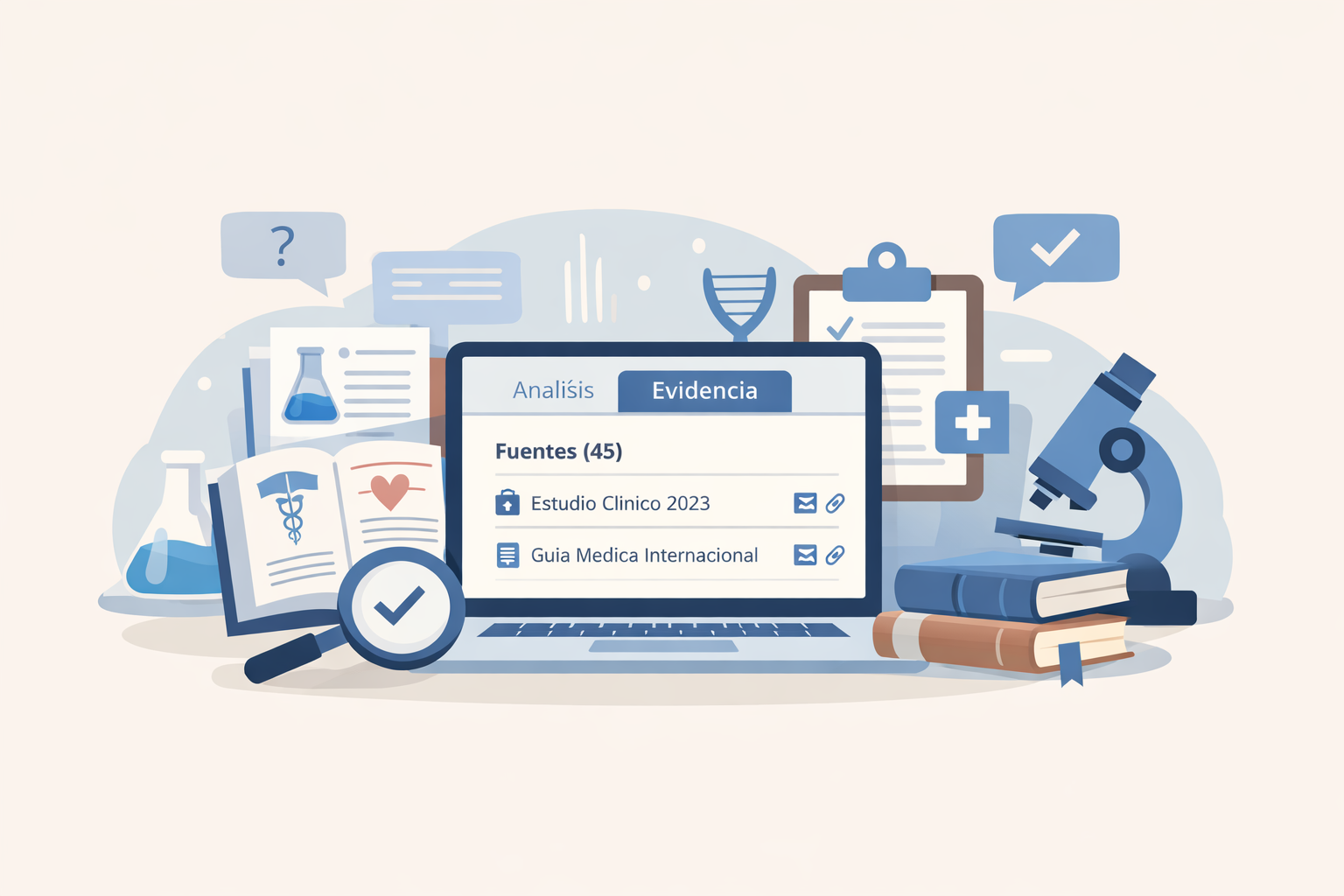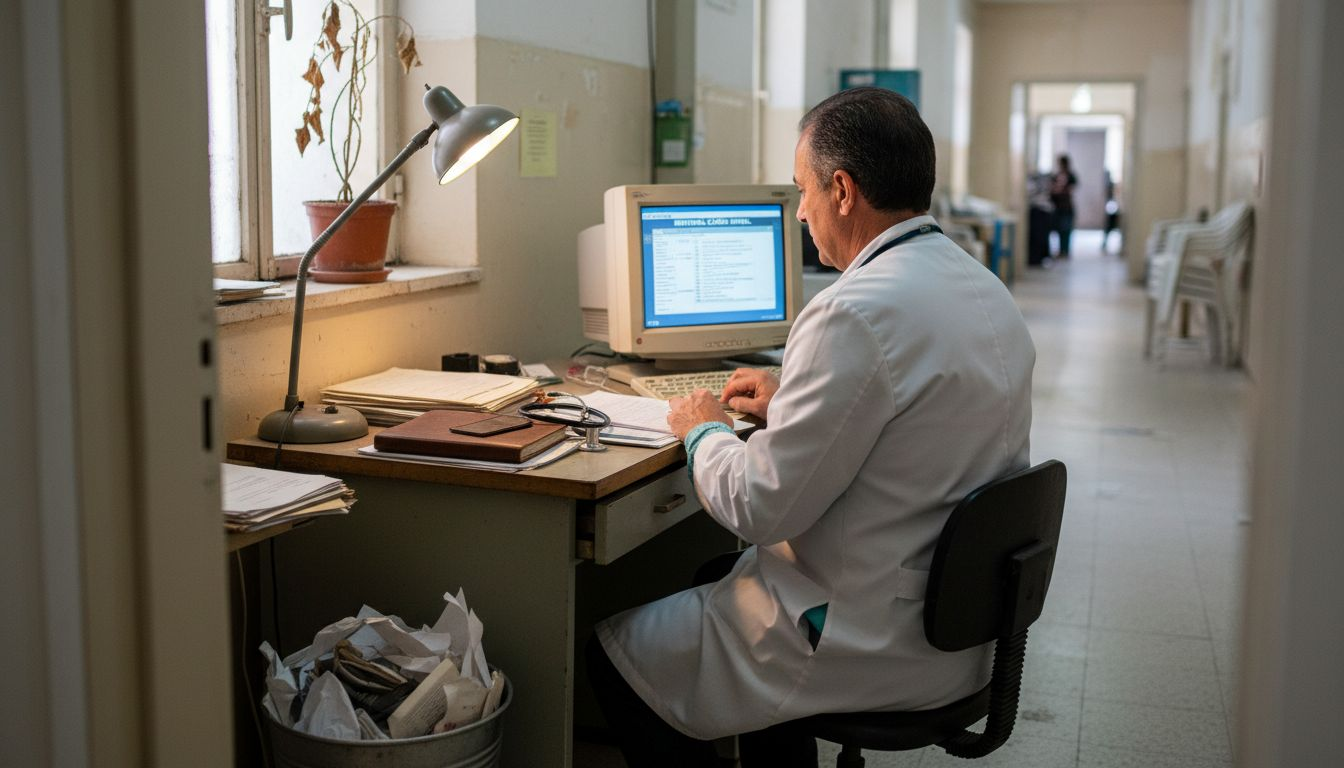Did you know that more than 60 percent of a psychiatrist's time is spent on administrative tasks? This reality limits patient care and increases office stress. Now, artificial intelligence promises to transform clinical documentation, streamlining processes and improving record quality. Discovering how these new tools reduce errors and protect privacy can radically change the professional practice of mental health.
Table of Contents
- Definition of documentation with ia in psychiatry
- Types of ia tools for clinical sessions
- Secure automated documentation process
- Legal regulations and privacy of medical data
- Risks, common mistakes and how to avoid them
- Comparative advantages over traditional methods
Key Points
| Point | Details |
|---|---|
| Automated Documentation | AI transforms the clinical record, enabling real-time data capture and analysis, increasing the efficiency of the process. |
| AI tools | There are several tools such as transcription systems and language analysis that enhance the diagnostic capacity of psychiatrists. |
| Security and Privacy | It is crucial to implement robust security protocols to protect sensitive patient information and comply with legal regulations. |
| Advantages over Traditional Methods | AI documentation improves the speed, accuracy and analysis of information compared to manual records, enabling a more patient-centered approach. |
Definition of documentation with AI in psychiatry
The documentation with artificial intelligence in psychiatry represents a revolutionary transformation in how mental health professionals record, analyze and process clinical information. This methodology involves using advanced technological tools that can automatically capture, structure and analyze data during psychiatric sessions.
At its core, AI documentation is characterized by several fundamental elements that distinguish it from traditional recording methods:
- Automatic data captureAI can transcribe and categorize clinical notes in real time.
- Pattern analysisIdentification of trends and correlations in the patient's medical record
- Generation of structured summariesCreation of complete and synthetic reports
- Context preservationMaintains the depth and nuances of clinical conversation.
The benefits of this approach are significant for mental health professionals. The guide to artificial intelligence in medicine stresses that these technologies allow psychiatrists to focus more on the patient, reducing the administrative burden and improving the quality of care. AI documentation does not replace clinical judgment, but rather enhances it, providing tools that complement the professional's expertise and sensitivity.
Types of AI tools for clinical sessions
Artificial intelligence tools for clinical sessions represent a diverse technological ecosystem designed to optimize and improve documentation and analysis processes in mental health. These systems are characterized by their ability to process complex information and generate accurate insights that complement the work of the professional.
The main types of AI tools can be classified into the following categories:
- Conversational transcription systems: Converting psychiatrist-patient dialogue into structured text
- Language analysis toolsImage analysis: Detection of emotional and semantic patterns in communication
- SOAP note generatorsClinical documentation creation is automated
- Risk assessment platforms: Identify potential critical situations based on the patient's history
For mental health professionals, the integration of these tools is fundamental. Our AI assistant for physicians demonstrates how technology can significantly simplify clinical work, allowing psychiatrists to spend more time on analysis and treatment, rather than on administrative tasks. The key is to understand that these tools are collaborative, not replacements, enhancing the diagnostic and therapeutic capacity of the professional.
Secure automated documentation process
Automated documentation in psychiatric settings requires an meticulous security process that ensures the integrity, confidentiality and accuracy of patient information. This process involves not only technological data capture, but a comprehensive strategy that protects sensitive information while optimizing clinical efficiency.
Key elements of a safe process include:
- Data encryptionProtection of information during transmission and storage
- Multilevel authenticationRobust verification of professional's identity
- Access traceabilityDetailed record of who accesses the information and when.
- Regulatory compliance: Strict adherence to data protection regulations
To implement these security standards, professionals can resort to specialized tools. The SOAP notes guide offers insights on how to integrate security protocols into digital documentation. The key is to develop a system that balances technological innovation with absolute protection of patient privacy, making security a fundamental component of the automated documentation process.

Legal regulations and privacy of medical data
The management of medical data in psychiatric settings requires a strict legal framework to ensure absolute protection of sensitive patient information. Current regulations set strict standards for the handling, storage and transmission of clinical data, recognizing the inherent vulnerability of mental health information.
Fundamental privacy principles include:
- Informed consentExplicit authorization of the patient for the use of his or her data.
- Data minimizationCollection of strictly necessary information only.
- Anonymization: Removal of personal identifiers in records
- Right to be forgottenPossibility of deletion of records at the patient's request.
Mental health professionals must carefully navigate this legal landscape. Answers for physicians with accurate references can help in understanding the nuances of these regulations. The key is to implement systems that not only comply with regulations, but also protect the fundamental trust between practitioner and patient, ensuring that personal information remains secure and under the sole control of the individual.
Risks, common mistakes and how to avoid them
The implementation of artificial intelligence in psychiatric documentation presents complex challenges that require a thorough understanding of their potential limitations and potential risks. Mental health professionals must be prepared to proactively identify and mitigate the most common pitfalls associated with these emerging technologies.
The most significant risks include:
- Algorithmic biasesIncorrect interpretations based on limited training data.
- Loss of contextualizationSuperficial interpretation of emotional and communicative nuances.
- Technological dependence: Reduced capacity for individual clinical assessment
- Fragmentation of the therapeutic relationshipInterference of technological tools in the patient-professional connection.
To navigate these challenges, practitioners can turn to specialized resources. The differential diagnosis guide offers crucial insights on how to maintain clinical judgment while integrating technological tools. The fundamental strategy is to consider AI as a complement, not a replacement, always keeping professional judgment at the core of psychiatric assessment and treatment.
Comparative advantages over traditional methods
Documentation with artificial intelligence represents a revolutionary technological leap in the psychiatric field, significantly outperforming traditional manual methods of recording and analyzing clinical information. Unlike conventional paper-based systems or static forms, AI tools offer dramatically more sophisticated processing and comprehension capabilities.
The main comparative advantages can be classified into the following dimensions:
Here is a comparison of advantages between AI documentation and traditional methods in psychiatry:
| Dimension | Documentation with IA | Traditional methods |
|---|---|---|
| Processing speed | Snapshot | Slow, working hours |
| Registration accuracy | High, fewer errors | Prone to omissions |
| Analytical depth | Detects hidden patterns | Limited to manual criteria |
| Adaptability | Upgradable protocols | Rigidity in procedures |
| Administrative burden | Significantly reduced | High for the professional |
- Processing speedInstant document generation vs. hours of manual labor
- Registration accuracy: Reduction of human errors and unintentional omissions
- Analytical depthAbility to identify non-obvious patterns and correlations.
- AdaptabilityConstant updating of protocols and documentation criteria.
To understand the scope of these innovations, practitioners can explore specialized differential diagnostic resources that illustrate how technology fundamentally transforms clinical practice. Artificial intelligence does not seek to replace the professional, but rather to enhance his or her analytical skills, freeing him or her from repetitive administrative tasks and allowing him or her to focus on what is truly important: comprehensive patient care and understanding.
Optimize psychiatric documentation with Itaca
The administrative burden and risk of errors in clinical documentation are ongoing challenges for psychiatry professionals who wish to focus fully on patient care. The guide “Psychiatry and AI: Essential Guidance for Documenting Sessions” highlights the need for tools that accurately capture the emotional and clinical context, reduce the time spent recording notes, and ensure privacy and data protection in accordance with current regulations.
At Itaca.ai We understand these realities and offer a platform designed specifically for physicians and psychiatrists seeking to automate the instant generation of SOAP notes, obtain diagnostic support through reliable referrals, and ensure secure and efficient management of clinical information. Our technology empowers your professional judgment without replacing it, freeing you from repetitive tasks so you can focus on what matters most: your patients.
Find out more about our innovations and tips in the section of Guides and stay up to date with the latest integrations at News.

Do you want to transform your clinical sessions by making them more precise and less tedious? Don't wait any longer to try Itaca.ai and experience a real change in your psychiatric practice. Visit now Itaca.ai and start optimizing your work today.
FAQ
What is artificial intelligence documentation in psychiatry?
Artificial intelligence documentation in psychiatry is the use of advanced technological tools to record, analyze and process clinical information automatically during psychiatric sessions.
What are the benefits of using AI in clinical documentation?
Benefits include reduced administrative burden, increased accuracy in data recording, the ability to identify patterns in the medical record, and automatic report generation, allowing psychiatrists to focus more on the patient.
What types of AI tools are used in psychiatry?
AI tools in psychiatry include conversational transcription systems, language analysis tools, SOAP note generators and risk assessment platforms that help optimize the clinical documentation and analysis process.
What are the risks associated with implementing AI in psychiatric documentation?
Risks include algorithmic biases, loss of context in communication, dependence on technology, and possible fragmentation of the therapeutic relationship between practitioner and patient.





Leave a Reply